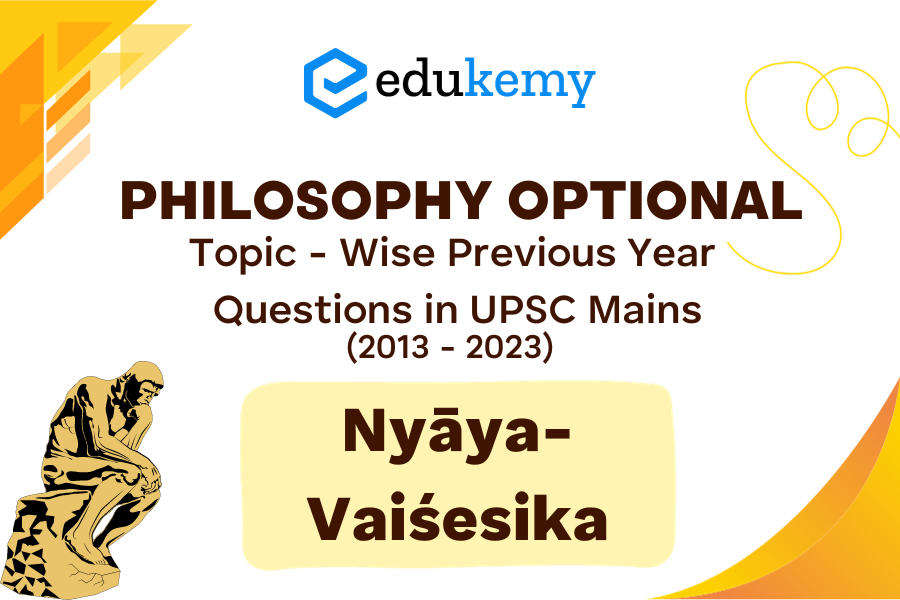
In the challenging landscape of the UPSC Mains examination, the choice of an optional subject is a pivotal decision that can greatly influence a candidate’s success. Among the myriad options available, the Philosophy optional has always held a unique allure for those with a penchant for profound thinking and intellectual exploration. This blog series delves into one of the most intriguing facets of the Philosophy optional – the Nyāya-Vaiśesika school. Specifically, we will explore a curated selection of previous year questions from 2013 to 2023, offering aspirants an invaluable resource to navigate the intricacies of this philosophical tradition in the context of the UPSC Mains examination.
The Nyāya-Vaiśesika school, rooted in ancient Indian philosophy, offers a fascinating exploration of epistemology, metaphysics, and ethics. As we traverse the spectrum of questions posed by the UPSC over the past decade, we’ll not only unravel the nuances of this profound tradition but also decode the evolving trends in the examination’s approach to philosophical subjects. Whether you’re a UPSC aspirant with a passion for philosophy or a curious mind seeking to understand the intricate web of Indian philosophical thought, this blog series aims to provide a comprehensive, insightful, and strategic guide for mastering the Nyāya-Vaiśesika optional topic in the UPSC Mains examination.
Contents
- 1 Nyāya-Vaiśesika Philosophy – Previous Year Questions (UPSC CSE Mains History Optional)
- 2 FAQs on Nyāya-Vaiśesika
- 2.1 Q: What is Nyāya-Vaiśesika philosophy?
- 2.2 Q: What are the key texts associated with Nyāya-Vaiśesika philosophy?
- 2.3 Q: How does Nyāya-Vaiśesika philosophy differ from other Indian philosophical schools?
- 2.4 Q: What are some prominent concepts in Nyāya-Vaiśesika philosophy?
- 2.5 Q: How can Nyāya-Vaiśesika philosophy be relevant in contemporary times?
- 3 In case you still have your doubts, contact us on 9811333901.
Nyāya-Vaiśesika Philosophy – Previous Year Questions (UPSC CSE Mains History Optional)
1. What are the necessary characteristics of padartha according to vaisesika philosophy ? (2017/10)
2. Explain the conditions of valid hetu as propounded in Nyaya philosophy. (2017/10)
3. Explain the early Nyaya definition of perception. Why this definition is considered inadequate by the later Naiyayikas ? (2017/20)
4. ‘Our knowledge is confined to gunas only’. Examine this statement in the light of Vaisesika and Buddhist controversy.(2015/15)
5. Is anyathakhyativada an adequate explanation of error?(2015/15)
6. Bring out the philosophical implications of introducingextraordinary(aluakik) perception in Nyaya philosophy. (2014/20)
7. What is Samavaya ? What are the grounds for accepting samavayaas distinct padartha ? (2013/10)
8. Analyse the Nyaya concept of vyapti and examine its relation withtark .(2013/12 ½)
9. Examine Nyaya-Vaisesika’s arguments for the existence of jivatma(soul).(2013/12 ½)
10. Do you find any inadequacy in the proofs for the existence of Godas given by Naiyayikas? Give reasons in support of your answer.(2011/15)
11. Why do the Vaisesikas treat Abhava as an independent category? Explain. (2011/15)
12. Explain the reason for introducing the notion of extraordinary perception in nyaya-epistemology. (2010/30)
13. Can qualities exist without substance? Substantiate your views inthe light of Nyaya-Buddhism controversy? (2010/20)
14. Hetvabhasa according to Nyaya.(2009/20)
15. Compare the viewpoints of Nyaya , Vaisesika , Mimansa andBuddhism on the issue of knowledge of abhava. (2009/60)
16. Samanya in Vaisesika. Short notes. (2008/20)
17. Discuss critically Nyaya notion of Vyapti. (2008/60)
18. Explain fully Nyaya’s Asatkaryavada. (2007/60)
19. Explain Nyaya theory of Pramanas. (2006/60)
20. Nature and kinds of Pratyaksha according to Nyaya. Short Notes.(2005/20)
21. State and discuss the nature and kinds of Dravyas according toVaisesikas. (2005/60)
22. Nature and kind of anumanas according to Nyaya. Short Notes.(2004/20)
23. The Nyaya-vaisesika view of Samanya. Short Notes. (2003/20)
24. Nyaya view of Self. Short Notes. (2002/20)
25. Evaluate the Nyaya-Vaisesika theory of the nature of Vyapti. (2001)
FAQs on Nyāya-Vaiśesika
Q: What is Nyāya-Vaiśesika philosophy?
A: Nyāya-Vaiśesika is a school of classical Indian philosophy that focuses on epistemology (theory of knowledge), metaphysics, and logic. Nyāya deals with the means of acquiring knowledge and the rules of correct reasoning, while Vaiśesika delves into the study of ontology, exploring the nature of reality and categories of existence.
Q: What are the key texts associated with Nyāya-Vaiśesika philosophy?
A: The Nyāya Sutras, attributed to sage Gautama, and the Vaiśesika Sutras, traditionally ascribed to Kanada, are the foundational texts for these philosophies. These texts provide the systematic frameworks and philosophical insights that are further elaborated upon by later commentators.
Q: How does Nyāya-Vaiśesika philosophy differ from other Indian philosophical schools?
A: Nyāya-Vaiśesika stands out with its emphasis on logic, atomism, and the detailed classification of the elements that constitute the universe. In contrast to other schools like Advaita Vedanta or Buddhism, Nyāya-Vaiśesika places greater importance on the empirical world and the pursuit of knowledge through reason and perception.
Q: What are some prominent concepts in Nyāya-Vaiśesika philosophy?
A: Notable concepts include “pramāṇa” (the valid means of knowledge), “padārtha” (the categories of reality), “anumāna” (inference), and “dravya” (substance). These concepts play a crucial role in shaping the philosophical discourse within the Nyāya-Vaiśesika tradition.
Q: How can Nyāya-Vaiśesika philosophy be relevant in contemporary times?
A: Although Nyāya-Vaiśesika is an ancient philosophical tradition, its exploration of knowledge, perception, and metaphysics continues to offer valuable insights into the nature of reality and human cognition. It provides a platform for addressing questions related to epistemology, ethics, and the philosophy of science, which remain relevant in modern philosophical discussions.
In case you still have your doubts, contact us on 9811333901.
For UPSC Prelims Resources, Click here
For Daily Updates and Study Material:
Join our Telegram Channel – Edukemy for IAS
- 1. Learn through Videos – here
- 2. Be Exam Ready by Practicing Daily MCQs – here
- 3. Daily Newsletter – Get all your Current Affairs Covered – here
- 4. Mains Answer Writing Practice – here

